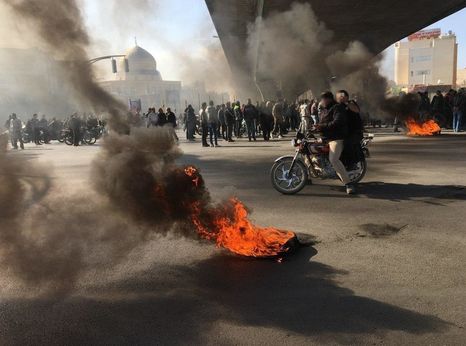Three men at risk of execution

Sentenced to death following coerced “confessions”
Amirhossein Moradi, 25, Mohammad Rajabi, 25, and Saeed Tamjidi, 27, have been convicted on several charges, including “enmity against God” (moharebeh), and sentenced them to death. On 18 February 2020, during his weekly press conference, Iran’s judiciary spokesperson accused them of being “riot leaders” who had “set fire to banks and petrol stations [during the nationwide protests in November 2019] and had filmed their criminal acts and sent the videos to foreign media”.
Amirhossein Moradi was arrested on 19 November 2019 and held for a week in a Ministry of Intelligence detention centre in Tehran, before being transferred to Evin Prison for a month. He was held in prolonged solitary confinement and interrogated without a lawyer present. He said he was subjected to torture and other ill-treatment. He said he only “confessed” after his interrogators promised to provide him with medical treatment for the injuries he sustained during torture. He was later refused the medical treatment they promised him.
Mohammad Rajabi and Saeed Tamjidi were arrested on 28 December 2019 and initially held in a Ministry of Intelligence detention centre in Tehran. Mohammad and Saeed said they were also subjected to torture and other ill-treatment. All three men were subjected to enforced disappearance for weeks following their arrests and denied access to a lawyer during the investigation.
On 24 December 2019, Amirhossein’s “confession” was broadcast in a propaganda video on State television, just days before their trial took place. The Islamic Republic of Iran Broadcasting Corporation showcased a video displaying the “confessions” of one woman and 12 men. Amirhossein was among them. The video was later used as evidence in the trial to convict all three men, on 5 and 6 January 2020.
Amnesty International does not have information on the treatment of the other 12 individuals shown in the video; however, since none of them are believed to have had access to a lawyer at the point of filming, and considering the well-established pattern of coerced public “confessions”, Amnesty International is concerned that none of them would have been able to freely consent to their appearance in the video.
Sweeping violence against protesters
Between 15 – 19 November 2019, Iranian authorities carried out brutal crackdowns against protests that took place in more than 100 cities across the country. According to credible sources, more than 300 people were killed, and thousands left injured, as security forces used unlawful, and lethal, force. Authorities arbitrarily arrested and detained thousands of protesters, including journalists, students, members of ethnic minority groups, and human rights defenders – including minority rights and labour rights activists.
Iranian authorities have subjected some detainees to enforced disappearance, torture and other ill-treatment. Many of the detainees’ families were threatened and warned not to speak to the media.
While most of the demonstrations appear to have been peaceful, in some instances, as the crackdown by security forces escalated, a small number of protesters turned to stone-throwing and acts of arson and damage to banks, seminaries and other property.
Amnesty International opposes the death penalty in all cases without exception, regardless of the nature of the crime, the characteristics of the offender, or the method used by the State to kill the prisoner. The organisation considers the death penalty a violation of the right to life and the ultimate cruel, inhuman and degrading punishment.
Social media
We suggest targeting Iran’s Supreme Leader (@khamenei_ir) and Minister of Foreign Affairs (@JZarif) on Twitter, as they are both regular users.
- Downloads
- Download in PDF
- Download in Word